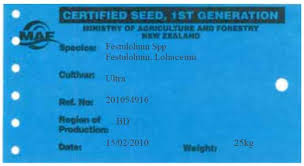What is Seed Certification?
It is a scheme with a process to verify varietal purity.
How does it work?
Crops and resultant seed must pass specific standards at the field (growing) stage and laboratory (processed) stage. Growers of ‘certified seed’ must have their farms and individual paddocks mapped and registered with the scheme. Growers enter their production areas for certification, including paddock details, sowing seed details and previous crop history, which can be verified against the scheme database.
AsureQuality field staff inspect growing crops for the presence of weed and off-type or other crop contaminants. Following harvest, packaging and certification labeling, the resultant crop is tested by the National Seed Laboratory for purity to ensure the seed is above the minimum standards for the species and is free of noxious weeds. (e.g. for perennial ryegrass – a minimum 98% purity and maximum 0.7% other seed).
All certified seed should have official certification labels attached to each bag, which verifies that the seed has met the field and laboratory standards, and therefore confirming its varietal identity. The label also provides traceability back to the field or production.







